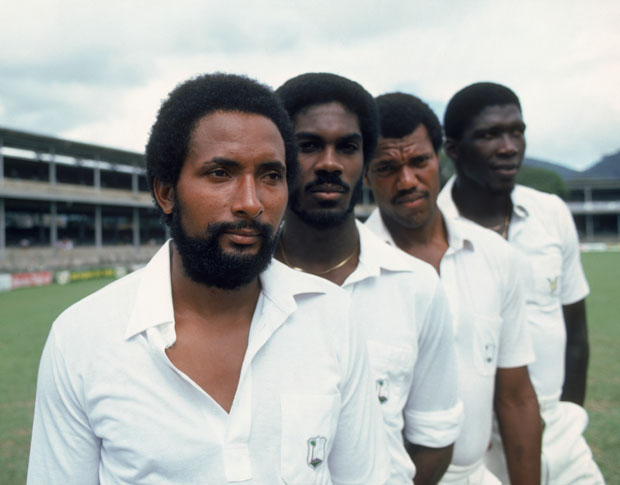Fire in Babylon – what lessons for West Indies cricket now?
As a new film about the all-conquering West Indies cricketers of the 1980s premieres, fast bowler Colin Croft tells Channel 4 News that there is no leadership to create heroes in the Windies today.
Fire in Babylon charters the epic struggle of the West Indies cricket team through the 1970s and 1980s as they became world champions, known for their fearsome and aggressive style of play.
But the documentary delves deeper beyond the sporting achievements and paints the victories against a backdrop of racism from which the Caribbean – and the wider world – was starting to emerge.
As film maker Stevan Riley told Channel 4 News, it was “a story of freedom, independence and black pride through bat and ball”.
That pride manifested itself on the pitch in ferociously fast bowling, designed as much to terrify opposing batsmen as to capture their wickets.
At the heart of this ethos – and the West Indies team – were four bowlers who each were able to bowl at over 90mph – earning themselves the nickname “the four horsemen of the apocalypse”: Michael Holding, Andy Roberts, Colin Croft and Joel Garner.

Channel 4 News Sports reporter Keme Nzerem travelled to the Oval to meet two of the “horsemen”, Colin Croft and Joel Garner. They described their feelings on the effect of cricket on Britain’s black youth at the time – especially when the Windies team came to play their former masters: England.
Colin Croft met British fans who said a victory on the cricket field went beyond the sporting arena.
“When the West Indies won,” Croft said, the fans told him “we could go to work with our backs straight and heads high.”
“I was proud that people could meet me on the street, on the buses and somebody walks up to you and says ‘Why thank you. Because you’ve represented us well’.
“I was very proud to hear that.”
Matthew Cain blogs: Cricket: hugely over-intellectualised by insecure men?
But it wasn’t just the bowlers the crowd came to see. The batsmen explained how they would use their anger at racial prejudice and direct it at the cricket ball.
Legendary batsman Sir Vivian Richards, known simply as Viv or King Viv, summed up the strength of feeling: “My bat was my sword and who you wanted to put it to”.
That passion led the West Indies team to a series of victories around the world and gave that world a new word: “Blackwash”, as the Windies would win a every game of a five-match series.
‘Everybody else in our team had to work their backsides off to play cricket well.’ – Colin Croft, cricketer
But that success has not carried through to modern Caribbean cricket – when asked why, fast bowler – now turned sports manager – Joel Garner sums it up in one word: Indiscipline.
“We have a lot of players with a lot of talent, but the problem is they do not like to work hard.
“The only way you become better is by practising the trade you like. Self-discipline more so than team discipline.”
Croft agrees, telling Channel 4 News that the lack of West Indies success today is not down to the lack of money in the business, or that the lure of basketball in the Americas is leaching talent.
He instead says the blame lays with management, and that there is “no plan” to cultivate that natural talent.
And he does not restrict that philosophy to today’s cricketers – he extends it to his world-class team who dominated the cricketing world 30 years ago:
“We had two or three people who – in my mind – were natural cricketers, athletes,” he says. “Everybody else in our team had to work their backsides off to play cricket well.”
<!–
–>